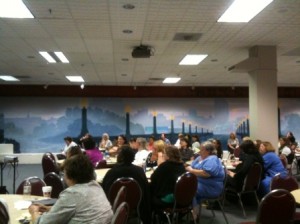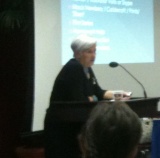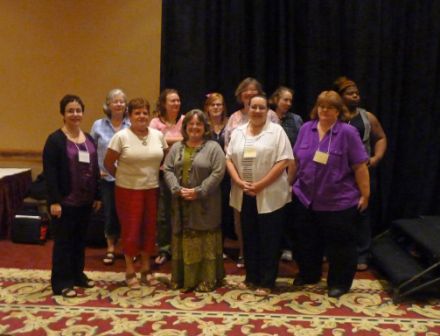 The South Carolina Collection Development Mini-Conference was an absolute blast! What an amazing event. Three days devoted to collection development, sponsored by the South Carolina State Library. There were 80 attendees every day, and folks were going home at night and letting their colleagues come in, so it wasn’t the same 80 people each day. One day was devoted to ebooks, one to adult collections, and one to kids and teens.
The South Carolina Collection Development Mini-Conference was an absolute blast! What an amazing event. Three days devoted to collection development, sponsored by the South Carolina State Library. There were 80 attendees every day, and folks were going home at night and letting their colleagues come in, so it wasn’t the same 80 people each day. One day was devoted to ebooks, one to adult collections, and one to kids and teens.
I was very fortunate to present for the adult collections and the teens on genre fiction. And, I was able to attend the day on kids and teens. Wow!
My presentation for the crowd on adult collection development was about genre fiction selection. “The Brave New World of Genre Fiction Selection, the Rap Sheet on the Fiction Vixen, or what the Locus are all these book blogs about?” It was a big title for a pretty big subject. I want to encourage collection development librarians to use book blogs as selection tools.
Why? The bloggers, including yours truly, cover more than just the traditional publishers. We cover a lot of ebook-only titles. Blogs may be the only review source for most ebook-only titles.
Blogs are as much, probably more, labors of love as they are anything else. Many are niche publications. If they cover a subgenre such as steampunk or biopunk or paranormal romance, they cover it more thoroughly than a general review magazine that has to cover the waterfront. And for a patron who wants stuff in their love and only their love, a specialized resource is where it’s at.
 The slides for the presentation included pictures representing some of the different subgenres, along with breakdowns of the components that make up those niches. A lot of us who read in a genre throw around our own jargon, like steampunk or cyberpunk or dystopia, and assume that everyone knows what we mean. (Us librarians do that too!) Hunting for images to show not just what cyberpunk looks like, but displaying a formula of what pieces of what genres make it up (Science fiction+ hackers+ artificial intelligence+ post-industrial dystopias+ very hard-boiled detectives) seemed to go over well.
The slides for the presentation included pictures representing some of the different subgenres, along with breakdowns of the components that make up those niches. A lot of us who read in a genre throw around our own jargon, like steampunk or cyberpunk or dystopia, and assume that everyone knows what we mean. (Us librarians do that too!) Hunting for images to show not just what cyberpunk looks like, but displaying a formula of what pieces of what genres make it up (Science fiction+ hackers+ artificial intelligence+ post-industrial dystopias+ very hard-boiled detectives) seemed to go over well.
I know the bibliography (webliography?) of recommended bloggers for book reviews I handed out disappeared like snow in July. I could have done a magic trick with that thing.
 The kids and teens day on September 14 was absolutely fabulous. Pat Scales, an expert not just on children’s literature but also on intellectual freedom issues (Pat is a member of the National Coalition Against Censorship Council of Advisors) spoke eloquently about ratings systems as censorship tools. The post-lunch panel discussion tackled a broad range of questions, including the debate whether users should find the materials they want in the library or should only be able to find “quality” material. This version of the “give them what they want” conundrum is usually applied to
The kids and teens day on September 14 was absolutely fabulous. Pat Scales, an expert not just on children’s literature but also on intellectual freedom issues (Pat is a member of the National Coalition Against Censorship Council of Advisors) spoke eloquently about ratings systems as censorship tools. The post-lunch panel discussion tackled a broad range of questions, including the debate whether users should find the materials they want in the library or should only be able to find “quality” material. This version of the “give them what they want” conundrum is usually applied to  so-called trashy fiction, but is just as applicable to SpongeBob SquarePants. The audience participation on this question was spirited. I think nearly everyone in the audience believed that every patron, no matter what their age, should find both their entertainment and their educational needs met at their local library. If we provide entertainment fiction, then we provide Spongebob.
so-called trashy fiction, but is just as applicable to SpongeBob SquarePants. The audience participation on this question was spirited. I think nearly everyone in the audience believed that every patron, no matter what their age, should find both their entertainment and their educational needs met at their local library. If we provide entertainment fiction, then we provide Spongebob.
 After the Great Debate, the Talk Tables started. I had a two-table sized group on the endless proliferation of vampire books in teen fiction. “V is for Vampire, W is for Werewolf, Z is for Zombie,” was the title. But I didn’t intend to talk about just the vamps. As one member of the group commented, in every box or cart of teen books, all the books are grey or black, with just a tiny hint of red on the cover. Everything is dark and angsty, whether there are vampires involved or not. It seems as if things are always darkest just before they turn completely black. Even the non-creepy books are dark and gritty. Based on the group discussion, teens may be tired of vampires in particular, but their literature isn’t turning toward sweetness and light any time soon. Just towards a different shade of grey. Or black.
After the Great Debate, the Talk Tables started. I had a two-table sized group on the endless proliferation of vampire books in teen fiction. “V is for Vampire, W is for Werewolf, Z is for Zombie,” was the title. But I didn’t intend to talk about just the vamps. As one member of the group commented, in every box or cart of teen books, all the books are grey or black, with just a tiny hint of red on the cover. Everything is dark and angsty, whether there are vampires involved or not. It seems as if things are always darkest just before they turn completely black. Even the non-creepy books are dark and gritty. Based on the group discussion, teens may be tired of vampires in particular, but their literature isn’t turning toward sweetness and light any time soon. Just towards a different shade of grey. Or black.
This was a great conference. I really enjoyed the energy. And I truly believe that book blogs are a terrific resource for library collection development, and I would love to have the opportunity to take the show on the road again. Hopefully to a library conference near you!






